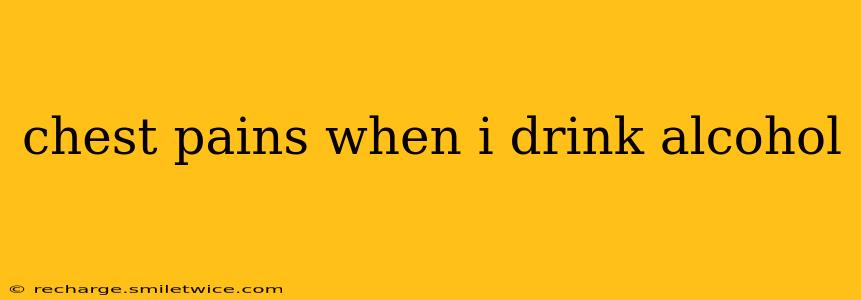Experiencing chest pain after consuming alcohol can be alarming. It's crucial to understand that chest pain is never something to ignore, and the potential causes linked to alcohol consumption range from relatively benign to serious medical emergencies. This comprehensive guide will explore various reasons why you might experience chest pain after drinking, offering insights to help you determine when to seek immediate medical attention.
What Causes Chest Pain After Drinking Alcohol?
Several factors can contribute to chest pain following alcohol consumption. These range from simple indigestion to potentially life-threatening heart conditions. Let's delve into some of the most common causes:
Acid Reflux/GERD
Alcohol can relax the lower esophageal sphincter (LES), the muscle that prevents stomach acid from flowing back into the esophagus. This relaxation allows stomach acid to reflux, causing heartburn and chest pain, often mistaken for a heart attack. Symptoms often include a burning sensation in the chest, which may worsen when lying down.
Heart Conditions
While less common, alcohol can exacerbate pre-existing heart conditions or trigger issues like angina (chest pain due to reduced blood flow to the heart). If you have a history of heart problems, chest pain after drinking warrants immediate medical attention. Alcohol can also contribute to irregular heartbeats (arrhythmias), another potential cause of chest pain.
Anxiety and Panic Attacks
Alcohol, even in moderate amounts, can heighten anxiety in some individuals. This anxiety can manifest as chest pain, shortness of breath, and rapid heartbeat, often mimicking symptoms of a heart attack. Underlying anxiety disorders can be significantly worsened by alcohol consumption.
Muscle Strains or Injuries
Sometimes, chest pain after drinking might be unrelated to the alcohol itself but rather exacerbated by it. If you've experienced a recent muscle strain or injury to your chest area, alcohol's muscle-relaxing effects could intensify the pain.
Pleurisy
This inflammation of the lining surrounding the lungs can cause sharp, stabbing chest pain, which can be worsened by alcohol consumption due to its potential to irritate the inflamed tissue.
Esophageal Spasm
Alcohol can trigger painful spasms in the esophagus, leading to chest pain that may feel constricting or squeezing. These spasms can be intense but usually resolve relatively quickly.
Is Chest Pain After Drinking Alcohol Always Serious?
No, chest pain after drinking alcohol isn't always a sign of a serious medical problem. However, it's crucial to distinguish between mild discomfort and potentially life-threatening symptoms. Mild discomfort, like heartburn, is often manageable with over-the-counter antacids.
When Should I Seek Immediate Medical Attention?
Seek immediate medical help if you experience:
- Sudden, severe chest pain: Especially if it's crushing, squeezing, or radiating to your arm, jaw, neck, or back.
- Shortness of breath: Difficulty breathing accompanied by chest pain is a serious warning sign.
- Sweating and nausea: These symptoms often accompany a heart attack.
- Lightheadedness or dizziness: These can indicate a serious cardiovascular event.
- Chest pain that doesn't improve with antacids: If over-the-counter remedies don't alleviate the pain, it warrants medical evaluation.
Can Certain Types of Alcohol Cause More Chest Pain Than Others?
The type of alcohol consumed may play a role, although research isn't definitive on this. Darker alcohols, like red wine, contain higher levels of certain compounds which might irritate the digestive system more readily than lighter alcohols, potentially contributing to heartburn and chest pain. However, the amount consumed is far more crucial than the type of alcohol.
How Can I Prevent Chest Pain After Drinking Alcohol?
- Moderate alcohol consumption: Limiting your intake significantly reduces the risk of alcohol-related chest pain.
- Eat before drinking: Food helps slow alcohol absorption and can reduce its irritating effects on the digestive system.
- Avoid trigger foods: If you notice specific foods worsen your symptoms, avoid them when drinking alcohol.
- Stay hydrated: Dehydration can exacerbate alcohol's effects on the body.
- Manage anxiety: If anxiety is a contributing factor, consider stress-reduction techniques or professional help.
- Address underlying medical conditions: Proper management of heart conditions, GERD, or other relevant health issues is crucial.
Disclaimer: This information is intended for general knowledge and informational purposes only, and does not constitute medical advice. It is essential to consult a healthcare professional for any health concerns or before making any decisions related to your health or treatment. They can accurately diagnose and recommend appropriate treatment based on your specific situation.
